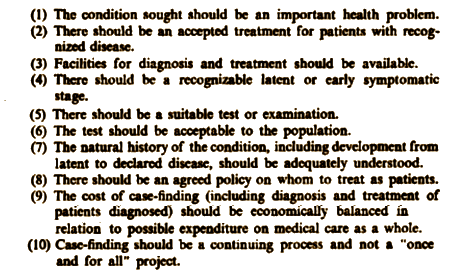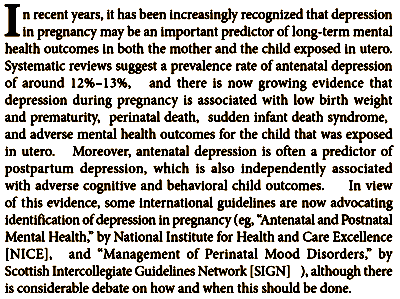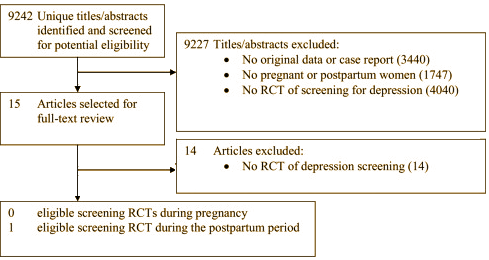Depression Screening and Patient Outcomes in Pregnancy or Postpartum: A Systematic Reviewby Brett D. Thombsa, Erin Arthursi, Stephanie Coronado-Montoya, Michelle Rosemana, Vanessa C. Delisle, Allison Leavensa, Brooke Levis, Laurent Azoulay, Cheri Smith, Luisa Ciofanik, James C. Coyne, Nancy Feeley, Simon Gilbodym, Joy Schinazin, Donna E. Stewart,and Phyllis ZelkowitzJournal of Psychosomatic Research, online 28 January 2014.
Objective: Clinical practice guidelines disagree on whether health care professionals should screen women for depression during pregnancy or postpartum. The objective of this systematic review was to determine whether depression screening improves depression outcomes among women during pregnancy or the postpartum period.Methods: Searches included the CINAHL, EMBASE, ISI, MEDLINE, and PsycINFO databases through April 1, 2013; manual journal searches; reference list reviews; citation tracking of included articles; and trial registry reviews. RCTs in any language that compared depression outcomes between women during pregnancy or postpartum randomized to undergo depression screening versus women not screened were eligible.Results: There were 9,242 unique titles/abstracts and 15 full-text articles reviewed. Only 1 RCT of screening postpartum was included, but none during pregnancy. The eligible postpartum study evaluated screening in mothers in Hong Kong with 2-month-old babies [N = 462] and reported a standardized mean difference for symptoms of depression at 6 months postpartum of 0.34 [95% confidence interval = 0.15 to 0.52, P < 0.001]. Standardized mean difference per 44 additional women treated in the intervention trial arm compared to the non-screening arm was approximately 1.8. Risk of bias was high, however, because the status of outcome measures was changed post-hoc and because the reported effect size per woman treated was 6–7 times the effect sizes reported in comparable depression care interventions.Conclusion: There is currently no evidence from any well-designed and conducted RCT that screening for depression would benefit women in pregnancy or postpartum. Existing guidelines that recommend depression screening during pregnancy or postpartum should be re-considered.
In summary, we did not find evidence to support recommendations to screen women for depression during pregnancy or postpartum. Well-designed and executed trials that assess the effects of depression screening and that can determine whether there is benefit to women in excess of costs and potential harms are needed. Ideally, a trial will be conducted that randomizes women who are not known to have depression to be screened versus not screened, with women identified as depressed in both trial arms having access to staff-assisted, collaborative depression care. Without evidence from such a trial, current screening recommendations should be re-evaluated. Instead of screening, health care professionals working with women during pregnancy and postpartum should be encouraged to provide women, as well as their partners and families, with information about depression. Health care professionals should also be alert to the possibility of depression among pregnant and postpartum women and should attend to symptoms that may suggest depression, such as low mood, anhedonia, insomnia, and suicidal thoughts, through assessment and, as appropriate, referral or management. Health care providers should be particularly vigilant for depression among women with general risk factors for depression or risk factors that have been identified in women in pregnancy or postpartum, including a history of depression, the presence of a chronic medical condition, unexplained somatic symptoms, chronic pain, increased and unexplained use of medical services, a history of traumatic life events, domestic violence, drug or alcohol abuse, low income, a low education level, single status or poor social support, and unintended pregnancy.
We’re used to the principles of preventive medicine being a part of our lives – antismoking campaigns, immunizations, serologic test for syphilis, pap smears, mammography, colonoscopy, etc. So screening is an acceptable part of modern life and seems intuitively like a good idea. But there’s no scientific principle that says that just because you can test for something means that you should use it as a screening test. The classic commentary on screening is a 1968 WHO monograph entitled the PRINCIPLES AND PRACTICE OF SCREENING FOR DISEASE [it’s a timeless document that was good enough to hold my attention most of the way through]. It lists the following guidelines for deciding when to screen:

by Linda B. Lydsdottir, MSc; Louise M. Howard, PhD; Halldora Olafsdottir, MD; Marga Thome, PhD; Petur Tyrfingsson, Cand Psych; and Jon F. Sigurdsson, PhDJournal of Clinical Psychiatry 10.4088/JCP.13m08646
[epub on-line 02/04/2014]
Objective: Few studies are available on the effectiveness of screening tools such as the Edinburgh Postnatal Depression Scale [EPDS] in pregnancy or the extent to which such tools may identify women with mental disorders other than depression. We therefore aimed to investigate the mental health characteristics of pregnant women who screen positive on the EPDS.Method: Consecutive women receiving antenatal care in primary care clinics [from November 2006 to July 2011] were invited to complete the EDPS in week 16 of pregnancy. All women who scored above 11 [screen positive] on the EPDS and randomly selected women who scored below 12 [screen negative] were invited to participate in a psychiatric diagnostic interview.Results: 2,411 women completed the EPDS. Two hundred thirty-three women [9.7%] were screened positive in week 16, of whom 153 [66%] agreed to a psychiatric diagnostic interview. Forty-eight women [31.4%] were diagnosed with major depressive disorder according to DSM-IV criteria, 20 [13.1%] with bipolar disorder, 93 [60.8%] with anxiety disorders [including 27 [17.6%] with obsessive-compulsive disorder [OCD]], 8 [5.2%] with dysthymia, 18 [11.8%] with somatoform disorder, 3 [2%] with an eating disorder, and 7 [4.6%] with current substance abuse. Women who screened positive were significantly more likely to have psychosocial risk factors, including being unemployed [χ2 = 23.37, P ≤ .001], lower educational status [χ2 = 31.68, P ≤ .001], and a history of partner violence [χ2 = 10.30, P ≤ 001], compared with the women who screened negative.Conclusions: Use of the EPDS early in the second trimester of pregnancy identifies a substantial number of women with potentially serious mental disorders other than depression, including bipolar disorder, OCD, and eating disorders. A comprehensive clinical assessment is therefore necessary following use of the EPDS during pregnancy to ensure that women who screen positive receive appropriate mental health management.
To be honest, I think my complaint about screening for mental health issues in general is primarily driven by seeing it as one more way that medical personnel are distancing themselves from their medical responsibility to patients. An alert team of health professionals isn’t going to miss the kind of problems these surveys might pick up. And I think that "you seem really worried" or "you look really down" is a better opening line that "your EPDS is 13." But beyond that, If we’re going to have evidence based medicine, we need some evidence. that mental health screening produces the desired results rather than falls into the categories of wasted effort or worse. I think that Canadian study up top is a brilliant first step in saying "show me." And pregnancy is a perfect place to study mental health screening because it is time limited and outcome comparison could be accurately assessed in a finite study.

It would be in the range of an undeclared conflict of interest for me not to add that some of my skepticism about mental health screening comes from the questions about things like the CAT-DI, CAT-ANX, and CAD-D testing recently introduced by Drs. Gibbons, Frank, Kupfer, Pilkonis, and Weiss [open letter to the APA…]. With the almost constant bombardment by figures about the public health burden of depression that introduces many of the articles in the industry financed psychopharmacology literature, I think my paranoia is justified. I don’t like using the phrase, "trolling for patients," but that evidence is unfortunately solid – certainly in the US. So we need to look at injunctions about screening very carefully. For example, 12-13% of pregnant women is a huge "market" as are the denizens of doctors’ waiting rooms.

Nice post, covers a lot of ground. Looking from the outside I know many of us can detect someone with a problem, even if we are not trained to identify the type of problem, or have treatment solutions.
As an aside my eye doctor always ask about any medications, and my answer is always no. We then talk about over medication of the population and her biggest worry is the increased number of people taking some type of anti-psychotic. She can identify them the moment they sit in the chair and she looks in their eyes.
“trolling for patients,” is the sad outcome of a revenue driven practice.
Steve Lucas
I imagine you would find similar results among people scheduled for dental hygiene appointments.
I wonder what the threshold for diagnosis of depression, bipolar disorder, OCD, and eating disorders was in that Lydsdottir et al study.
If low enough, you’ll find “mental illness” everywhere. And then you can start throwing prescriptions at it, particularly if you can find it in women. “Take these drugs for the good of the baby!”
See http://news.brown.edu/pressreleases/2014/02/polypharmacy
“….A new study of patients with bipolar disorder finds that 36 percent of those who were admitted to a Rhode Island psychiatric hospital in 2010 were receiving “complex polypharmacy” — four or more psychotropic medications — from their community providers. The polypharmacy rate was significantly higher for women. Including prescriptions for other conditions the patients may have had, the average patient was on six medications. ….”
Now, how can any physician believe that throwing 5 or 6 drugs into a human being is a good thing?
A number of years ago on another blog polypharmacy was discussed and everyone was shocked when one medical professional reported treating patients taking 36 or more medications.
I cannot but be reminded of Mother’s Little Helper from the 1960’s. The more things change the more they stay the same.
Steve Lucas
Congratulations on this excellent blog from one (not-boring) old(er) guy to another. Lots of work and heavy lifting here that someone needs to do. I wish I were more interested in psychiatry qua psychiatry, episteme and professional politics, instead of humble and largely inarticulate techne. But perhaps they also serve, some of them anyway, who only sit and do.
Most of what is dealt with here is well above my head, but I have the general impression that if I understood it, I would probably agree with it. I am glad you have taken the time and trouble to address the issues, which I find it easiest, though irresponsible, to ignore.
Cura te ipsum.